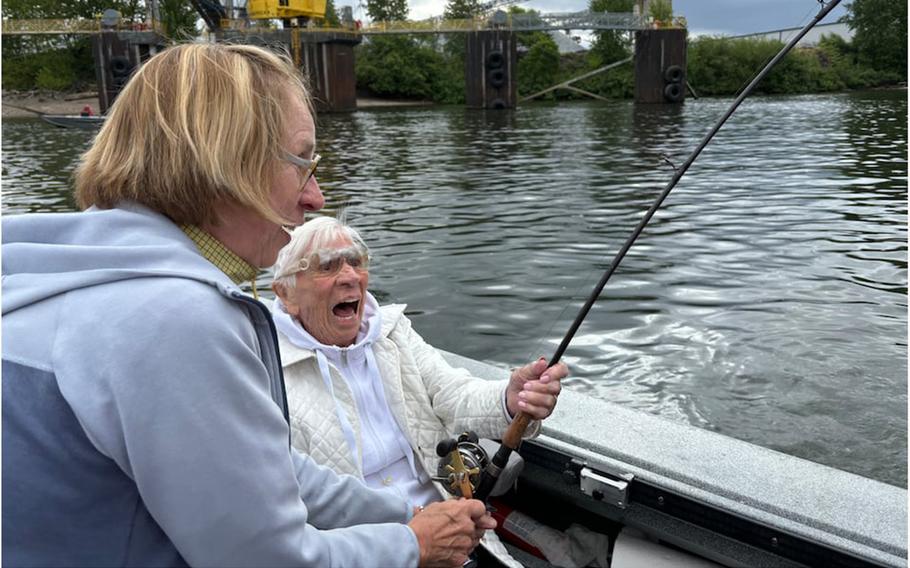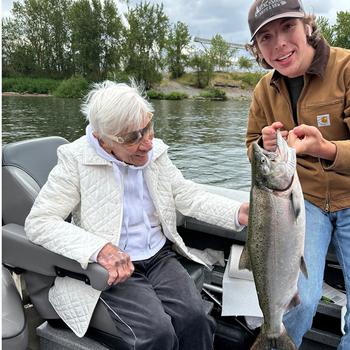
Even at 100 years old, Betsy Jeffords is both strong enough to hang on to a salmon-tugging rod and excited enough to scream with delight as her daughter, Susan Jeffords, helps her reel. (Bill Monroe/TNS)
“Oh no! I think I lost it......WHOA! WHEEeee...”
As Betsy Jeffords, a 100-year-old WWII veteran of the U.S. Navy Air Corps took a firm grip on her “joystick,” an angry 10.7-pound spring chinook salmon charged the boat, then turned and headed back to sea as the 107-pounder fought back.
She screamed, her reel screamed, everyone screamed and pandemonium erupted as Jeffords’ daughter, Susan, stepped in to help her mother with reeling as the “altimeter” fluctuated wildly.
Chairs out of the way, rods to put up, net flying, keep the kicker away from the line, grab a camera, watch out for other boats...
Several minutes and two tearing runs later, the first salmon ever caught by the oldest person in the boat was deftly netted by the youngest (and, even at 16, arguably the best angler), deckhand Mason Waddle of Longview.
(The salmon’s tenth of Jeffords’ weight is estimated since it tipped the scale a bit more than 10 pounds after bleeding, which accounts for less than an additional pound.)
“WOW!” she exclaimed as Waddle and his grandfather, host John Shmilenko of Portland, checked to ensure it was a legal hatchery fish, then high-fived and lifted it into the boat.

Centenarian Betsy Jeffords is amazed at her catch, skillfully netted for her by 16-year-old Mason Waddle of Longview, Wash. (Bill Monroe/TNS)
The animated centenarian sat for a moment in complete silence, staring at her prize.
The best metaphor for Navy Air might be that the 100-year-old became an ace. With six rods deployed and the pressure on, the extremely elusive fish came to the rod closest to her — “My own rod!” she would later accurately note.
“I didn’t know at first why I had to get up so early,” Jeffords said. “They (Susan, 70, and her husband, Greg Powell, 67,) told me we were going fishing and I wondered why would I want to do that, but they said I’d have fun.
“It’s amazing,” she said. “Here we are on a boat eating salmon (smoked snacks), catching a fish less than 30 minutes from the house.”
Jeffords is determined to remain active.
Noting other WWII veterans are aging and passing, she’s proud to be moving up the list of survivors.
Recalling a recent story about one of the world’s oldest living humans at 114, Jeffords said, “I can beat that.”
Jeffords enlisted in the Navy in 1943, an 18-year-old from a small town in eastern Pennsylvania stricken by patriotism and reading news of fallen neighbors and classmates.
“Staying in a small town wasn’t going to do anyone any good,” she said.
She wasn’t a pilot, although she often got to fly at the Pensacola Naval Air Station in Florida. Jeffords was one of the new “Waves” in a program signed into law by President Franklin Roosevelt in 1942.
“It was totally oddball,” she said. “At first, they didn’t really know what to do with us.”
The Navy educated her as a “box trainer,” technically, a link trainer also known as a “blue box and pilot trainer.” It was a precursor to today’s modern flight simulators. Pilots were enclosed in a windowless “box” with nothing but gauges in front of them as Jeffords taught them how to use the dials.
“They had to find their way back to a base or an aircraft carrier,” she said. “It’s not a very big place at sea so they needed their instruments.”
Her students (“those young men”) sometimes took her up in “fighters, bombers, all kinds of planes” she recalled. “I once thought ‘flying looks so easy!’ But of course, it wasn’t.”
It was an exciting time for a young woman in Florida, with parties, dancing, beaches and sightseeing, but also too often sobering as she and other Waves were drawn to the base bulletin board, grimly recognizing the names of airmen lost in action they’d known and trained.
“It was so sad that some of those boys didn’t come back,” she said with a small shake of her head.
Her vital service is largely unsung to the public, but not at the top of the chain of command. Jeffords received congratulatory letters from both President Joe Biden and Carlos Del Toro, secretary of the Navy, thanking her for her service to the country and congratulating her on the 100-year milestone (she’ll launch another in September).
After the war, Jeffords married a Marine pilot and war veteran, Thomas Watson “TW”Jeffords, who passed in 1988.
Today, Jeffords is simultaneously pragmatic, irritated and determined to win her current battle with lung cancer — Waves, sailors, pilots, everyone smoked during the war, she said.
“I’m going to fight it,” she said. “I’ve still got things to do.”
Next up? Maybe a jet boat tour of the Willamette River, then a visit to a trout farm (she loves rainbow trout).
Jeffords lives in Portland with her daughter and son-in-law and will move with them to California in the fall (she prefers the heat), then return next spring to a second home in Bend, near her grandson.
“I’d like to go back to Hawaii,” she said. “And I’ve always wanted to go on a safari; and Australia, it seems so different.”
While catching a salmon may not have been on her bucket list, it was clearly a welcome addition for all three Wednesday, not to mention a joy for Shmilenko, Waddle and myself to witness.
“I can see why you like to fish,” she said. “I feel like I’m far away, like I’m a different person.
“It’s like an openness on the water.”
©2024 Advance Local Media LLC.
Visit oregonlive.com.
Distributed by Tribune Content Agency, LLC.